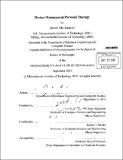Device-transparent personal storage
Author(s)
Strauss, Jacob A. (Jacob Alo), 1979-
DownloadFull printable version (7.578Mb)
Other Contributors
Massachusetts Institute of Technology. Dept. of Electrical Engineering and Computer Science.
Advisor
M. Frans Kaashoek and Robert T. Morris.
Terms of use
Metadata
Show full item recordAbstract
Users increasingly store data collections such as digital photographs on multiple personal devices, each of which typically presents the user with a storage management interface isolated from the contents of all other devices. The result is that collections easily become disorganized and drift out of sync. This thesis presents Eyo, a novel personal storage system that provides device transparency: a user can think in terms of "file X", rather than "file X on device Y", and will see the same set of files on all personal devices. Eyo allows a user to view and manage the entire collection of objects from any of their devices, even from disconnected devices and devices with too little storage to hold all the object content. Eyo separates metadata (application-specific attributes of objects) from the content of objects, allowing even storage-limited devices to store all metadata and thus provide device transparency. Fully replicated metadata allows any set of Eyo devices to efficiently synchronize updates. Applications can specify flexible placement rules to guide Eyo's partial replication of object contents across devices. Eyo's application interface provides first-class access to object version history. If multiple disconnected devices update an object concurrently, Eyo preserves each resulting divergent version of that object. Applications can then examine the history and either coalesce the conflicting versions without user direction, or incorporate these versions naturally into their existing user interfaces. Experiments using Eyo for storage in several example applications-media players, a photo editor, podcast manager, and an email interface-show that device transparency can be had with minor application changes, and within the storage and bandwidth capabilities of typical portable devices.
Description
Thesis (Ph. D.)--Massachusetts Institute of Technology, Dept. of Electrical Engineering and Computer Science, 2010. Cataloged from PDF version of thesis. Includes bibliographical references (p. 83-87).
Date issued
2010Department
Massachusetts Institute of Technology. Department of Electrical Engineering and Computer SciencePublisher
Massachusetts Institute of Technology
Keywords
Electrical Engineering and Computer Science.